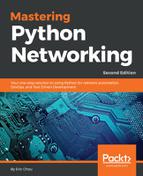Standard loops in playbooks are often used to easily perform similar tasks multiple times. The syntax for standard loops is very easy: the {{ item }} variable is the placeholder looping over the with_items list. For example, take a look at the following section in the chapter5_4.yml playbook:
tasks:
- name: echo loop items
command: echo {{ item }}
with_items: ['r1', 'r2', 'r3', 'r4', 'r5']
It will loop over the five list items with the same echo command:
TASK [echo loop items] *********************************************************
changed: [192.168.199.185] => (item=r1)
changed: [192.168.199.185] => (item=r2)
changed: [192.168.199.185] => (item=r3)
changed: [192.168.199.185] => (item=r4)
changed: [192.168.199.185] => (item=r5)
We will combine the standard loop with the network command module in the chapter5_5.yml playbook to add multiple VLANs to the device:
tasks:
- name: add vlans
eos_config:
lines:
- vlan {{ item }}
provider: "{{ cli }}"
with_items:
- 100
- 200
- 300
The with_items list can also be read from a variable, which gives greater flexibility to the structure of your playbook:
vars:
vlan_numbers: [100, 200, 300]
<skip>
tasks:
- name: add vlans
eos_config:
lines:
- vlan {{ item }}
provider: "{{ cli }}"
with_items: "{{ vlan_numbers }}"
The standard loop is a great time saver when it comes to performing redundant tasks in a playbook. It also makes the playbook more readable by reducing the lines required for the task.
In the next section, we will take a look at looping over dictionaries.
